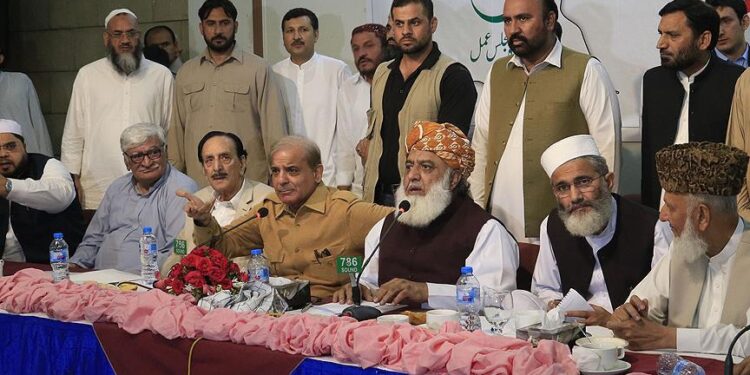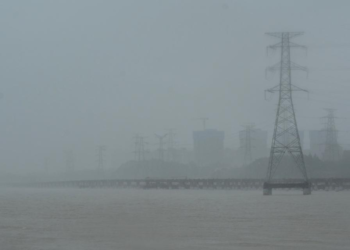Islamabad, March 9 (AsiaFreePress): The united opposition is banking its hopes for the success of its no-confidence motion against the government on the estranged members of the ruling PTI and its allies.
As both the rival camps are laying claims to have the required strength to defeat each other, the current statistics reveal that excluding Jamat-e-Islami’s one vote, the government has a total of 178 members in the National Assembly including PTI’s 155 members, MQM-P’s seven, five each from the PML-Q and BAP, GDA’s three, one each from AMLP and JWP, and an independent member. The demise of one PTI MNA deprived the ruling party of one vote.
The opposition has a total of 162 votes including PML-N’s 84, PPP’s 56, MMAP’s 14, BNP’s four, three independent candidates, and ANP’s one. Since the JI’s one vote can go either way, therefore, the government’s number can either reach 179 or the opposition’s strength can touch 163 members.
With the demise of one MNA, the lower house of parliament’s current strength stands at 341. If the JI abstains, then the total votes would be 340.
For making the no-trust motion successful, the opposition needs to have the support of at least 172 of the total 342 members in the lower house of parliament to show a simple majority — leading to the choosing of a new prime minister. Political analysts conjectured that the opposition could bag the support of 10 lawmakers or more from the ruling party or any of the allies as they had been in touch with it for quite some time now.
One lawmaker said PTI members were in touch with the opposition since it had defeated the government for the capital’s seat in the Senate elections, forcing Prime Minister Imran Khan to take a vote of confidence at that time. Opposition lawmakers shared that the PML-N had bagged the support of 16 PTI members in exchange for giving them its party tickets in the next elections.
Similarly, the PPP has managed to win over four MNAs, while the JUI-F had received assurance of support from three MNAs, bringing the total to 23 – just one more than what PML-N leader Shahid Khaqan Abbasi had earlier claimed and way more than the required number of lawmakers needed to show a simple majority in the House.
For days, the nation has remained on its toes because of the mounting pressure from the opposition parties on the government. However, the once-considered loyalists forming new factions within the ruling party has changed the scenario a bit for the opposition, government and its coalition partners.
Two main allies of the government, the PML-Q and MQM-P, who believed that they were on the driving seat, have all of sudden felt that senior PTI leader Aleem Khan joining the Jahangir Khan Tareen group has weakened their position.
The disgruntled group currently has six votes but the number might increase as well. If given to the opposition, these six votes, as well as one possible one from PTI’s Noor Alam Khan, who has openly been asking to place the names of the prime minister and the lawmakers sitting in the first three rows on the treasury benches on the Exit Control List, are enough to shake the foundation of the government even if the allies stand by the ruling party.
As a result of the development, PML-Q President Chaudhry Shujaat Hussain called on JUI-F chief Maulana Fazlur Rehman, who also heads the opposition alliance Pakistan Democratic Movement (PDM), at his residence.
Shujaat previously only received guests, including PM Imran, PML-N President Shehbaz Sharif after a gap of 14 years, and former president Asif Ali Zardari at his residence in Lahore.
A wheelchair-bound Shujaat along with his son, MNA Chaudhry Salik, and Federal Housing Minister Tariq Basheer Cheema, met the JUI-F chief.
Sources claimed that Shujaat had asked the Maulana to count them in the opposition camp. However, Shujaat’s cousin Chaudhry Pervaiz Elahi, who is the Punjab Assembly speaker, and his son, Moonis Elahi, the water resources minister, has been openly siding with the government.
Insiders said due to the rigid approach of the premier in connection with keeping Usman Buzdar as the chief minister of Punjab, PTI members were feeling estranged and ready to jump ship.
Sources said key ministers were still trying to convince PM Imran to change the Punjab CM and cater to the demands of the disgruntled members.
However, they further added that some PTI members had already been given personal assurances from the top opposition leadership to be accommodated in the next elections and were less likely to stand by the government under the current situation. The government has also been claiming that it was ready to turn tables on the opposition as it was in touch with five or seven MNAs of the opposition parties.
Another possibility is that the treasury benches’ lawmakers can resign even before the no-trust motion is put to vote and then the government will have to prove its majority in the House. This can lead to real political crisis as both sides would not be able to show a majority assuming that a dozen or more government MNAs resign to support the opposition while simultaneously escaping the consequences of the defection clause.
The opposition is demanding neutrality from the ‘powerful circles’. However, political analysts said the ‘powerful circles’ could still completely change the situation if they started continuing their political management as they had in the past on several occasions since the PTI came to power.




















